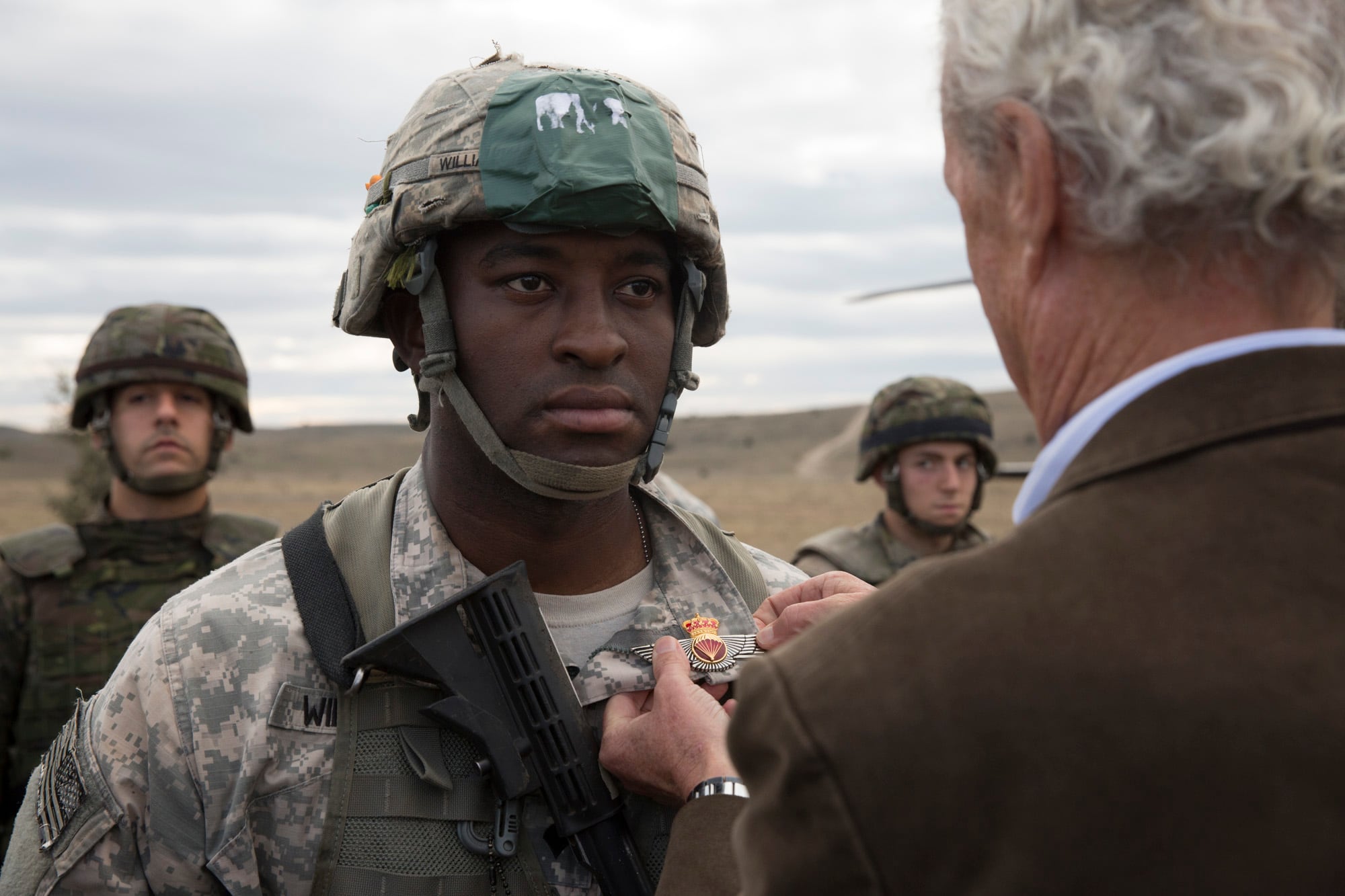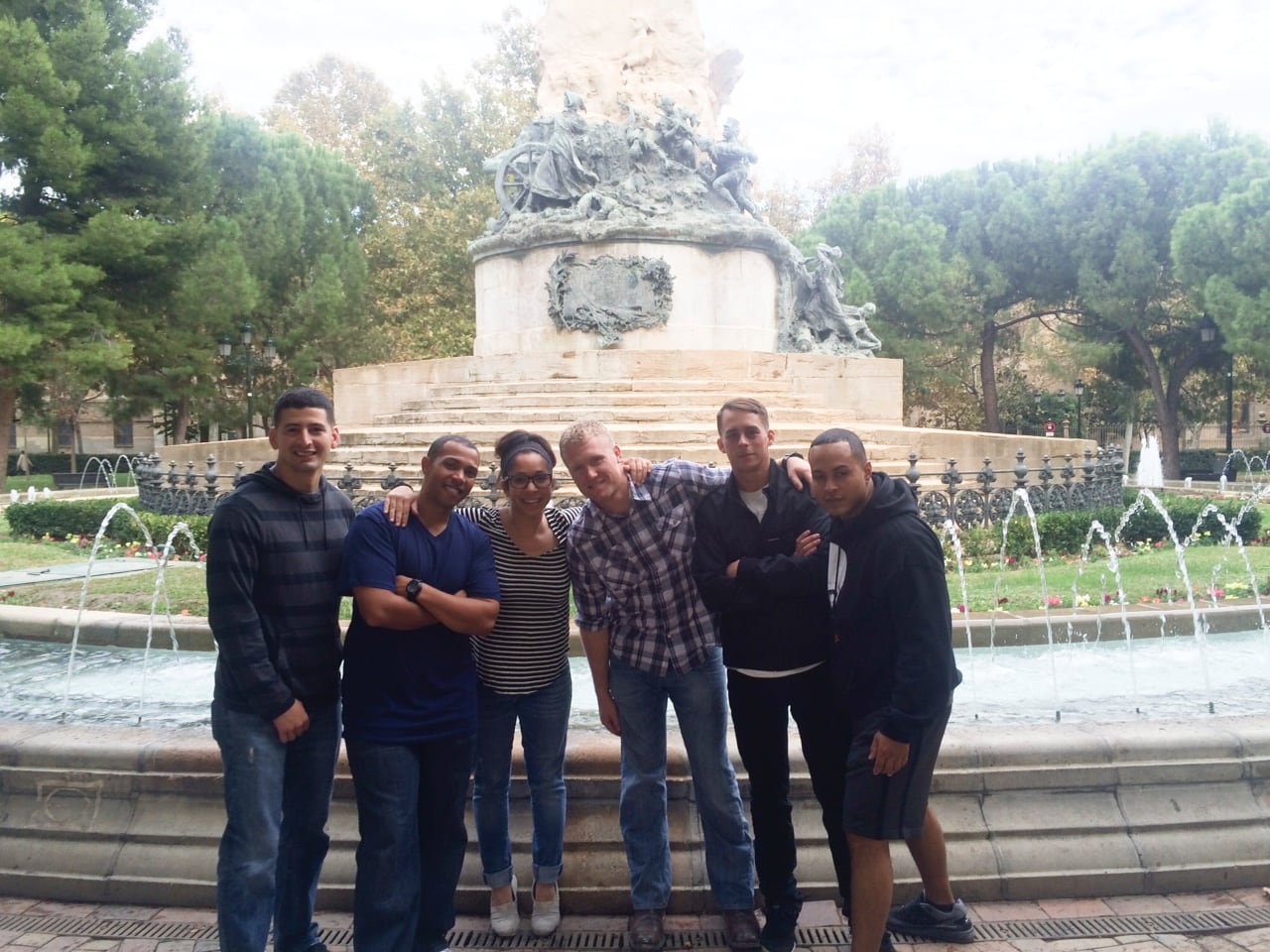Zaragoza, Spain — Hundreds of U.S. paratroopers were honored in a ceremony here Friday for their role in the biggest NATO exercise in more than a decade.
The 82nd Airborne Division's jump into Spain left an impression on many spectators as it capped a massive 1,800-troop NATO demonstration on Wednesday. But their trip from Fort Bragg, North Carolina, might have left a bigger impression on the 2nd Brigade soldiers floating down to the Spanish soil in front of a global audience.

The Spanish Minister of Defense Pedro Morenes presents U.S. Army Spc. Isiah Williams with Spanish parachute wings at Exercise Trident Juncture 2015 on Nov. 4, near Zaragoza, Spain.
Photo Credit: Daniel Woolfolk/Staff
About 500 U.S. paratroopers from the 82nd jumped into the San Gregorio Exercise and Training Area along with 23 Spanish paratroopers, a culminating event at the end of the two-week Trident Juncture 2015, a land, maritime and air exercise involving 36,000 troops from over more than 30 countries.
"This was probably my best experience in the Army," Pfc. Daniel Rivera told Army Times on Friday.
All of the U.S. soldiers received airborne badges from the Spanish army, some on the day of the jump, but most during the Friday ceremony at the U.S. camp, where Spanish Gen. Luis Cebrian thanked the paratroopers for their efforts.
The Spanish paratroopers had spent a week at Fort Bragg preparing for the jump. During the preparation, the U.S. and Spanish troops learned each other's safety procedures.
The language barrier limited communication among them. But the preparation was also a welcome experience to soldiers.
"It added somewhat to the authenticity" to have a Spanish jumpmaster along, Pvt. 1st Class Chandler Smith said shortly after the jump, adding that it was his first time out of the country. "I really appreciate the opportunity to come over and experience a foreign country."
They took off at 11 p.m. Tuesday in the rain at Fort Bragg, and about nine hours later, after an in-flight refueling and rigging, the doors opened over the southern edge of the Pyrenees Mountains to a beautiful clear afternoon in Spain.
The mountains leveled to rolling hills before they jumped.
Though the jump represented the grand finale of the 13-nation, 1,800-soldier demonstration that day, the paratroopers represented just a small part of the exhibition designed for the media, and ostensibly, Russia, which has been increasingly aggressive outside its own borders recently.
While they played a small part in the month-long exercise Trident Juncture, they recognized the broader effort to integrate various forces into an allied response.
"It's great to see that the relationship with our brothers is so tight," Sgt. Stephen Sandoval said of the alliance after landing.
'Once in a lifetime'
Adding a dimension to the U.S. soldiers' experience, buses took them into downtown Zaragoza on Thursday night to introduce them to a slice of Spain beyond the rolling, rocky terrain and their campsite.

82nd Airborne Division soldiers visit Zaragoza, Spain, as part of a cultural exchange on Nov. 5.
Photo Credit: Courtesy of Juan Garcia
Capt. Andrew Vogl said he and other leaders pushed to make sure soldiers experienced Spain beyond the makeshift tent camp in the unpopulated training area.
Falcon Brigade spent about four hours wandering the downtown, where they saw the Basilica Nuestra Señora del Pilar, the latest in a series of churches on that site since the 1st century AD, according to local tradition. It dominates the skyline of the city, which is bisected by a river.
Off of that centerpiece, narrow, winding streets are tightly flanked by largely four- to seven-story buildings with Spanish architectural flourishes. Various restaurants and bars lined the streets, and roaming LGOPs (little groups of paratroopers) could be seen scattered around trying out different establishments.
Sgt. Oscar Martinez said he was the only one in his group who knew any Spanish. A bartender asked him about "OTAN" (the Spanish acronym for NATO) and mentioned Europe's issues with terrorism.
Martinez said he didn't experience any anti-U.S. sentiment during the visit. (Scattered protests were reported against NATO and the exercise before and during the event.)
"(The Spanish) made us feel welcome to the city," Martinez said.
With combat in Afghanistan and Iraq ended and deployments down to a trickle compared to a few years ago, many of the soldiers said they have never been deployed. Some have never left the U.S.
"The Army's drawing down. With the wars winding down, it's time to train and integrate with other armies. It's definitely a once-in-a-lifetime opportunity," said Staff Sgt. Adam Doran.
"Doing this definitely improved my morale," Rivera said. "Being in garrison can get boring after a while."
For those on their first tour, it could either be a lasting memory or even prod a soldier on the fence of re-enlistment who had previously spent most of his time in garrison.
"This will be the significant memory of a lot of people's time in the Army," Vogl said.




